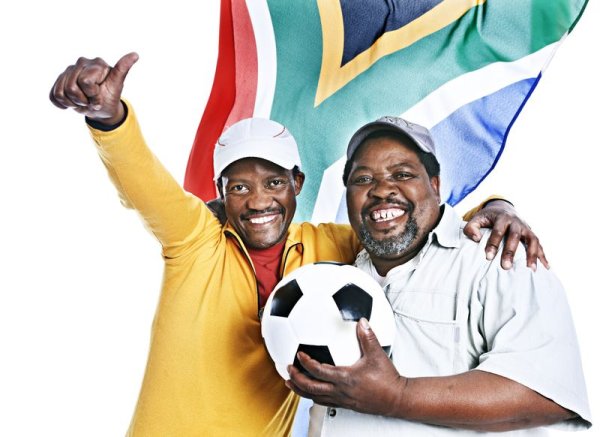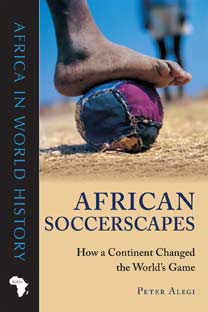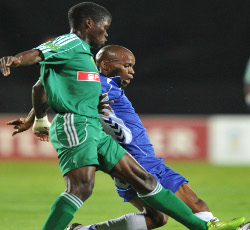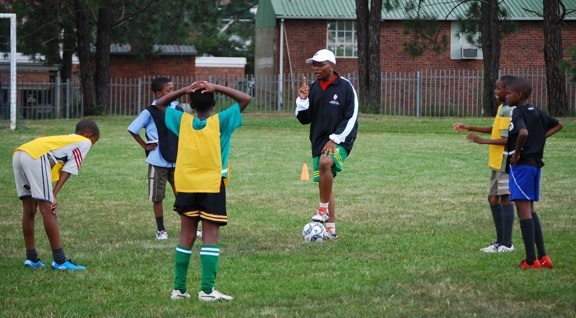
There’s nothing like this: the German Academic Exchange Service‘s ‘Extra Time’ soccer lecture series. It links the two host countries of 2006 and 2010, and celebrates the first ever World Cup on African soil. Featuring German, South African, and international scholars, the eight lectures aim to inspire public debate on the social and cultural dimensions of football. The events take place in World Cup host cities which are also university cities.
On Friday, 7 May, the focus is on ‘Soccer and History’. I will speak about African Soccerscapes, Philip Bonner (Wits University) on the game’s past in the Johannesburg area, Sedick Isaacs on soccer in Robben Island prison, Christiane Eisenberg (Humboldt University Berlin) on the history of FIFA.
The event is free and open to the public. It kicks off at 9:30 a.m. in the Senate Chamber, University of KwaZulu-Natal, Durban Westville Campus.
Click here for the complete schedule of the German-South African Soccer Lecture Series.
Category: Hosting
New Book: African Soccerscapes
 Released ahead of the 2010 World Cup in South Africa, my new book African Soccerscapes tells the little-known story of football in Africa. Published by Ohio University Press in North America and Hurst & Co. in Europe and Africa, the book is both a history and an examination of the connections between sport and society. Using case studies from around the continent, I show how Africans appropriated soccer from Europeans and turned it into a distinctively African activity during the twentieth century.
Released ahead of the 2010 World Cup in South Africa, my new book African Soccerscapes tells the little-known story of football in Africa. Published by Ohio University Press in North America and Hurst & Co. in Europe and Africa, the book is both a history and an examination of the connections between sport and society. Using case studies from around the continent, I show how Africans appropriated soccer from Europeans and turned it into a distinctively African activity during the twentieth century.
African players, fans, and officials challenged colonial power and expressed a commitment to racial equality and self-determination. In postcolonial times, new nations staged matches in national stadiums as part of their independence celebrations and joined FIFA. The Confédération Africaine de Football democratized the global game through antiapartheid sanctions and increased the number of African teams in the World Cup finals.
African Soccerscapes analyzes the causes and effects of the departure of huge numbers of African players to overseas clubs and the dominance of commercial interests in local leagues. Finally, a consideration of the growth of women’s soccer and South Africa’s hosting of the 2010 World Cup challenges the one-dimensional notion of Africa as a backward, “tribal” continent populated by victims of war, corruption, famine, and disease.
Look for stories from African Soccerscapes on this blog, as well as news and updates about book events, talks, media coverage and more.
Vuvuzela 1 PSL 0

A family night out with 6,000 friends. Maritzburg United vs Amazulu: KwaZulu-Natal derby in the round of 32 of the Nedbank Cup, South Africa’s FA Cup. At kickoff, deafening kwaito music gives way to a cacophony of vuvuzelas. Not exactly kid friendly, but there it is. The relaxed mood of this Saturday night crowd, a pleasant mix of men, women and children of all backgrounds, makes up for the dreadful football on display.
The home side is slightly more enterprising in the second half, but deep into injury time the visitors’ Brad Ritson scores a counter-attack winner. Cruel. Final.
As we, the deflated masses, leave the friendly confines of Harry Gwala Stadium, I found myself wondering — again — why PSL teams played such awful soccer on a regular basis. Then I thought of the wisdom shared by Thabo Dladla, director of Izichwe Youth Football (where my daughter plays), in his column this week:
‘The idea of playing and keeping the ball longer does not exist . . . [with] less than 100 completed passes in most PSL matches’ Dladla writes, ‘I doubt if Lionel Messi would have played under most South African coaches. [In the apartheid era] football played a huge role in entertaining people. It was important to win in style. Both players and fans had a lot of fun during a game. These days one sees more creativity in the grandstands than on the field’. And as much as I viscerally detest the vuvuzela’s sonic pollution, it is the truth.
World Cup ticket mess

600 FNB branches in South Africa failed soccer fans today. I waited at my branch for hours with students, cops, lecturers, government employees, farmers, housewives and South Africans from other walks of life only to be told that ‘the system was down’. We waited with Job-like patience, hoping against hope that we could buy a ticket for a seat at stadiums built with the people’s tax money.
But it was all for naught. Precious few tickets were sold to us and a few thousand to South Africans at FNB branches nationwide. What a disgrace. Had such a mess happened in Italy there would have been riots! So it’s looking increasingly likely that the main place ordinary locals will taste the World Cup is in the Fan Parks . . . providing ‘color’ for tourists and FIFA’s global TV audience. Shame!
Radio Debate: Africa’s First World Cup
Radio France International‘s Brent Gregston invited me to discuss Africa’s First World Cup on his ‘Crossrads Debate’ program. ‘Billions of people will see the football World Cup played out in glittering new stadiums built by the rainbow nation of South Africa. But few black Africans can afford to book a seat. Will the continent’s first World Cup be a unifying force in Africa? And how much does the feel-good factor depend on the performance of South African footballers?’
Click here to listen to the program.
Talking Football in KwaZulu-Natal

Thabo Dladla is a highly committed youth coach and former professional player with AmaZulu FC. His weekly ‘Talking Football’ column in a Pietermaritzburg newspaper focuses on the game at the grassroots, not on the 2010 World Cup or the PSL. ‘There is something wrong when a country with over 48 million people and a huge football budget cannot produce good players,’ writes Dladla this week.
‘I still believe that our country has some of the best talent at U12 level but poor leadership is letting the youth down. We have too many politicians and sports leaders who are more interested in the benefits that can be gained for themselves, than the sport itself.
‘Post 2010 South African youth deserve better than what they are getting now. The transformation of football should be felt at the lowest of levels. We can no longer allow a situation where a few get fatter while the players continue to suffer.’
World Cup Tickets: The Saga Continues
FIFA General Secretary Jerome Valcke revealed that tickets prices for South African residents will be slashed to ensure that all World Cup matches will be ‘sold out’. Thousands of Category 2 and 3 tickets will be sold at Category 4 prices — twenty US dollars — although details on sales have not yet been released. This announcement came on the heels of news that FIFA expects to make a marginal loss on the tournament. Valcke placed part of the blame on airlines and travel agencies for overcharging foreign football tourists. In South Africa, however, FIFA’s byzantine ticketing process — heavily reliant on internet-based credit card sales — has been criticized. Others say Bafana Bafana’s mediocrity has not helped and that even the lower ticket prices are beyond the reach of most ordinary South Africans.